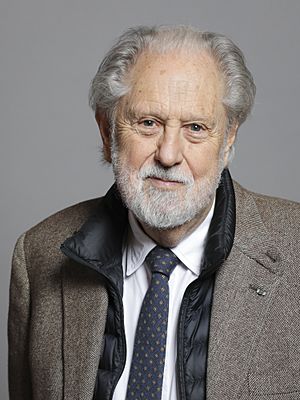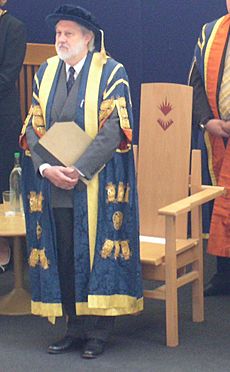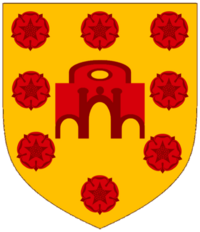David Puttnam facts for kids
Quick facts for kids
The Lord Puttnam
|
|
|---|---|

Official portrait, 2020
|
|
| Chancellor of the Open University | |
| In office 3 October 2007 – 12 March 2014 |
|
| Preceded by | The Baroness Boothroyd |
| Succeeded by | The Baroness Lane-Fox of Soho |
| Chancellor of the University of Sunderland | |
| In office 1997–2007 |
|
| Preceded by | Office established |
| Succeeded by | Steve Cram |
| Member of the House of Lords Lord Temporal |
|
| In office 27 October 1997 – 27 October 2021 Life Peerage |
|
| Personal details | |
| Born |
David Terence Puttnam
25 February 1941 Southgate, Middlesex, England |
| Political party | Labour |
| Spouse |
Patricia Mary Jones
(m. 1961) |
| Children | 2 |
| Residences | Skibbereen, County Cork, Ireland |
| Occupation | Film producer and educator |
David Terence Puttnam, Baron Puttnam (born 25 February 1941), is a famous British-Irish film producer, educator, and environmentalist. He was also a member of the House of Lords, which is part of the UK Parliament. Lord Puttnam has produced many well-known films. These include Chariots of Fire, which won the top award for Best Picture, The Mission, The Killing Fields, Local Hero, Midnight Express, and Memphis Belle.
In 1982, he received a special award from the BAFTA for his great contribution to British cinema. Later, in 2006, he was given the BAFTA Fellowship, which is a lifetime achievement award. From 1997 to 2021, Lord Puttnam was a member of the House of Lords. In 2019, he became the head of a special committee. This committee looked into how digital technology affects democracy. They shared their findings in a report in June 2020.
Contents
Early Life and Career Beginnings
David Terence Puttnam was born in Southgate, London, England, on February 25, 1941. His mother, Marie Beatrix, was a housewife, and his father, Leonard Arthur Puttnam, was a photographer. David went to Minchenden Grammar School in London. He started his career in advertising, where he worked for five important years at a company called Collett Dickenson Pearce. He also worked as an agent for famous photographers like David Bailey and Brian Duffy.
Film Production Journey
Starting with Sandy Lieberson
In the late 1960s, David Puttnam began producing films. He worked with Sanford Lieberson's company, Goodtimes Enterprises. Their first movie was Melody (1971), which was written by Alan Parker. This film became a small success.
Puttnam and Lieberson also produced several documentaries. These included Peacemaking 1919 (1971) and Glastonbury Fayre (1972). Their second feature film, The Pied Piper (1972), was not as successful. However, That'll Be the Day (1973), starring David Essex, was a big hit.
They continued to make films like the science fiction movie The Final Programme (1973). They also produced more documentaries, such as Double Headed Eagle: Hitler's Rise to Power 1918–1933 (1973) and Swastika (1974). Puttnam and Lieberson also helped produce Mahler (1974) and a sequel to That'll Be The Day, called Stardust (1974).
Their partnership ended after Lisztomania (1975), which did not do well at the box office. Puttnam then had a big success with Bugsy Malone (1976). This musical was written and directed by Alan Parker. It was the last film Puttnam made under the Goodtimes company. After this, he started his own new company, Enigma Films.
Creating Films with Enigma Films
With his new company, Enigma Films, Puttnam produced The Duellists (1977). This was the first film directed by Ridley Scott. He also produced Midnight Express (1978), which was a huge success. This film was directed by Alan Parker and written by Oliver Stone.
Puttnam then made his first film in America, Foxes (1980). However, this movie did not do well. His next film, Chariots of Fire (1981), became his most successful yet. Directed by Hugh Hudson, it was a massive hit and won the Academy Award for Best Picture.
Puttnam also started a television company, Enigma TV. They made several TV films, including a series called First Love for Channel Four. Some of these films were P'tang, Yang, Kipperbang (1982) and Secrets (1983).
He continued to produce successful feature films. These included Local Hero (1983), written and directed by Bill Forsyth. He also produced the highly praised Cal (1984) and The Killing Fields (1984). In 1986, he produced The Mission, which won a major award at the Cannes Film Festival.
Leading Columbia Pictures
From June 1986 to September 1987, Puttnam was the chairman and CEO of Columbia Pictures, a major film studio. He decided to focus on making smaller, less expensive films instead of big-budget ones. This decision was not popular with some people in Hollywood.
Producing Films After Columbia
After leaving Columbia Pictures, Puttnam went back to producing individual films. His later works include Memphis Belle (1990), Meeting Venus (1991), and War of the Buttons (1994). He also helped produce TV movies like The Josephine Baker Story (1991).
In 2015, Puttnam returned to film production to work on a movie called Don’t Trust, Don’t Fear, Don’t Beg. He stepped away from this role in 2019 when he was asked to lead the House of Lords committee on digital technology.
Today, Puttnam holds many important roles. He is the President of the Film Distributors’ Association and a UNICEF Ambassador. He is also a professor of Film Studies at University College Cork.
Involvement in Politics
In 1997, David Puttnam became a member of the House of Lords, which is the upper house of the UK Parliament. He was given the title Baron Puttnam. In 2002, he led a committee that looked at a new law about communications. This committee suggested a change to prevent large newspaper companies from owning British TV stations.
From 2004 to 2005, Puttnam led a group that studied how Parliament communicates with the public. Their report encouraged political parties to improve parliamentary life. From 2012 to 2017, Puttnam was a special trade envoy for the Prime Minister to several countries in Southeast Asia. During this time, he was also named Ireland's Digital Champion.
In August 2014, Puttnam was one of 200 public figures who signed a letter against Scottish independence. In June 2019, he chaired a special House of Lords committee. This committee investigated how digital technologies affect democracy. Their report, published in June 2020, made many suggestions to the government. These suggestions aimed to deal with the spread of false information and build public trust.
Lord Puttnam announced his retirement from the House of Lords in October 2021. He explained his reasons for leaving in a speech.
Atticus Education
In 2012, Puttnam started Atticus Education. This organization provides interactive seminars about film and other subjects to schools and universities around the world.
Contributions to Education
David Puttnam has been very involved in education. For 10 years, he was the chairman of the National Film and Television School. In 2017, he became its Life President. He also founded Skillset, an organization that trains young people for jobs in the film and television industries. From 2002 to 2009, he was the UK president of UNICEF.
Puttnam was the first Chancellor of the University of Sunderland from 1997 to 2007. He was also given the Freedom of the City of Sunderland. In 1998, he started the National Teaching Awards. He was also the Chancellor of the Open University from 2006 to 2017.
Puttnam supports Schools North East, an organization for schools in the North East of England. He is also a patron of the Shakespeare Schools Foundation. This charity helps school children perform Shakespeare plays in professional theaters.
From 2014 to 2018, Puttnam was the Chair of the Academic Board for Pearson College. In March 2015, he was made a freeman of Gateshead. This was to recognize his work as chairman at the Sage Gateshead.
In October 2022, Lord Puttnam received a fellowship from City Lit. This was for his important contributions to film and media.
Awards and Recognition
In 1982, Puttnam received the BAFTA Michael Balcon Award. This was for his outstanding work in the British film industry. In 1983, he was appointed a CBE. In 1995, he was made a Knight Bachelor.
In February 2006, Puttnam was given the BAFTA Fellowship. He used this moment to honor his late father. His father had passed away before seeing him win the Best Picture Oscar for Chariots of Fire. He also praised filmmakers who made honest films.
Puttnam has received over 50 honorary degrees and fellowships. These include awards from Heriot-Watt University in 2001 and Trinity College Dublin in 2016. In 2003, he received the Royal Photographic Society's President's Medal. In May 2006, he became an Honorary Fellow of the Royal Society of Arts.
On July 12, 2007, Puttnam was given the freedom of the City of Sunderland. In 2008, he received an Honorary Degree from Nottingham Trent University. This was for his great impact on UK culture and his support for the GameCity Festival. He was also elected to the Royal Irish Academy in 2017.
In 2009, Puttnam released an education documentary called We Are the People We've Been Waiting For. This film featured famous people talking about their experiences with education.
Overall, Puttnam's films have won many awards. These include 10 Oscars, 31 BAFTAs, 13 Golden Globes, and the Palme d'Or at Cannes.
|
Other Interests and Activities
Puttnam was the deputy Chairman of Channel 4 Television from 2006 to 2012. He is also the president of the Film Distributors' Association (FDA). He co-wrote a book called Movies and Money with Neil Watson, published in 2000.
In April 2007, Puttnam became the chairman of Profero, a digital marketing agency. He explained that his experience in marketing, entertainment, and social issues would help the company.
He also contributed a chapter to a book called For Ian Charleson: A Tribute in 1990. On August 19, 2007, Puttnam gave a speech at the annual Michael Collins event in Ireland.
Helping Others (Philanthropy)
Puttnam supports two charities. He is a patron of Camara Education, an Irish education charity. He also supports Action for ME, a charity for people with CFS/ME.
Personal Life
On June 21, 2022, David Puttnam announced that he and his wife, Patricia ("Patsy"), had become Irish citizens. The couple has lived in Skibbereen, County Cork, Ireland, since 1998.
Filmography
Selected Films Produced by David Puttnam
- Melody (1971)
- The Pied Piper (1972)
- Glastonbury Fayre (1972) (documentary)
- That'll Be the Day (1973)
- Mahler (1974)
- Stardust (1974)
- Lisztomania (1975)
- Bugsy Malone (1976)
- The Duellists (1977)
- Midnight Express (1978)
- Foxes (1980)
- Chariots of Fire (1981)
- Local Hero (1982)
- Secrets (1983)
- Sharma and Beyond (1984)
- The Killing Fields (1984)
- Cal (1984)
- The Mission (1986)
- Ishtar (1987)
- Memphis Belle (1990)
- Meeting Venus (1991)
- Being Human (1994)
- War of the Buttons (1994)
- My Life So Far (1999)
Films Made or Acquired While Head of Columbia (1986–1988)
While leading Columbia Pictures, Puttnam approved or acquired many films. Some of these were released after he left his position.
- The Adventures of Baron Munchausen (1988)
- The Adventures of Milo and Otis (1989)
- The Beast (1988)
- The Big Easy (1986)
- The Big Town (1987)
- Hope and Glory (1987)
- Housekeeping (1987)
- The Last Emperor (1987)
- Leonard Part 6 (1987)
- Little Nikita (1988)
- Old Gringo (1989)
- Karate Kid III (1989)
- Me and Him (1988)
- The New Adventures of Pippi Longstocking (1988)
- Pulse (1988)
- Punchline (1988)
- Rocket Gibraltar (1988)
- School Daze (1988)
- Someone to Watch Over Me (1987)
- Stars and Bars (1988)
- Time of the Gypsies (1988)
- A Time of Destiny (1988)
- Vibes (1988)
- Vice Versa (1988)
- Zelly and Me (1988)
See also
 In Spanish: David Puttnam para niños
In Spanish: David Puttnam para niños
 | Aurelia Browder |
 | Nannie Helen Burroughs |
 | Michelle Alexander |




